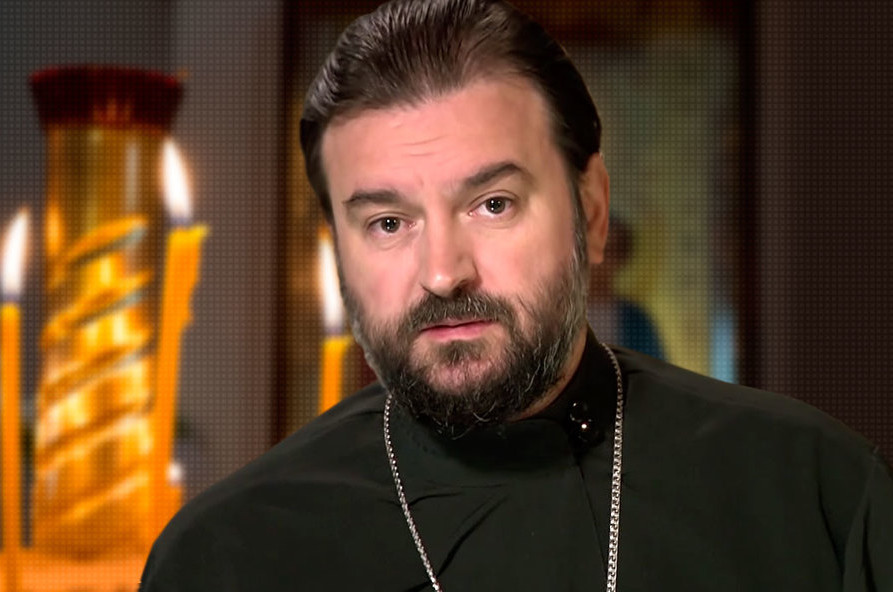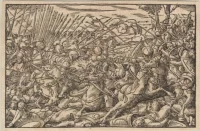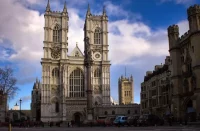Archpriest Andrei Tkachev answers questions for a Serbian TV channel.
This is an interview from January 5, 2022, before Russia’s military operation in Ukraine, which began February 24. Fr. Andrei Tkachev is from Lvov in western Ukraine, and was serving as the priest of a church in Kiev during the Maidan revolution, and therefore he is qualified to speak about events in Ukraine. Fr. Andrei did not support the violent revolution that resulted in the overthrow of the Ukrainian government, and his and his family’s lives were threatened because of his outspoken stance. He now serves in Moscow.
—Father Andrei, thank you for agreeing to speak with Serbian Sputnik. You are well known here and in Serbia, ten or more of your published books have been translated to Serbian, not sure how many you had published in Russian—probably a lot more. Well, the last time we saw each other was in Serbia; sadly, the pandemic has transformed our lives in so many ways. We live in challenging times, when people lose faith, feel lonely and isolated, there is such an awful division among us, and then our values… We are losing them, they are simply crumbling before our eyes. Tell me where we should find strength again.
—Over the last decade, we witnessed how this ideology of mindless comfort has taken hold of us. Everything, absolutely everything is allowed. Then, suddenly, it has given way to an era of mind-numbing fear for your own life. In fact, the rotten insides of a modern man have been exposed, as if pried open with a can opener. It turns out a modern man never prays or barely prays, and hardly ever places his hopes in God; he is so worried about himself, willing to give up all his rights and freedoms for his life to last longer, say, for a few more years. It was a lesson, a slap in the face, if you will, that puts all of us belonging to European civilization back in our place. There is always only one way out, no matter how many troubles we encountered—to be close to Him, our Creator, as everything is in His hand. All of it is like in the book of the Prophet Habakkuk who speaks of God, plague went before him, in other words, truly terrifying things… and pestilence followed his steps, that is, a drought or a disease or something else—all of it has to do with God. Modern man doesn’t do this, he doesn’t connect his life’s events—such as snow, ice, drought, rain, or disease—with God. Rather he explains it away (as some) other driving forces behind all of it. In fact, everything in life begins, so to speak, and connects with moral law and our attitude with God. So, come back, prodigal children! It means that in any troubles God is saying: Come back to me. You can’t do anything without Me. You are a cowardly, weak, lonely, and miserable man. That is, if you’ve forgotten about it, I’ll send you a reminder. That is, man should return to God in repentance, gratitude, prayer, and having a desire to change. If we are to return to normal life, it should be a better life. Not the one we had before—partying, clubs, restaurants, drinking, having fun, leading a carefree lifestyle. There should be no place for that lifestyle anymore. If we return back to normal, we should somewhat change for the better.

—Is this some kind of a warning? I remember how you told me in an interview two years ago that the end of the world could be closer than we thought.
—Of course. It can happen overnight. Since the exact timing is hidden from us, we have to be ready, as it can happen instantly. We should have the fear of God. Without question, it is aimed to achieve only one great providential goal—to teach man to fear God. Whatever it is going to be, no matter what happens… And mankind has witnessed far more brutal things. There were times when the corpses would lay unburied, as there were so many dead people that they were littering the streets like bird droppings. And at that time, the people would come to faith, repent and help one another; they’d get their act together, never giving in to despair. So, judging from the times of trouble we had before, it’s obvious how much weaker we have become since then.
—So, it is a sort of war, right? Besides this pandemic, the Russian people (are facing) countless challenges. A strange time has come because the Russians are getting blamed for almost everything, almost like during the Soviet times; it’s even their fault that the wind is blowing. They are portrayed as sinister and dreadful people…
—In the eyes of the society.
—In the eyes of Western society. Russians are always seen in a bad light. What happened? Why is it so? How can it be explained? Because we know—a Russian man, as well as Russia, is the harbinger of Orthodoxy and a bearer of spirituality; that’s how it has always been.
—The Russian nation in its present capacity, and hopefully, ever more so in the future, is a living reproach for the modern West because we have regained what we once lost while they lost what they once had. Then, let’s say, in the 1960s or even 1950s, or before the era of “The Beatles,” so to speak, the USA was a truly devout Christian country. That is, today’s LGBT, BLM, and all the transgender movements, all these changes in social norms regarding sexuality were simply unthinkable back then. It was a puritan, pious country, everyone was at church on Sundays, everyone read the Bible, and so forth. Then, the time came when they lost it all in an instant. I mean, Europe was actually a pioneer of godlessness; as for America—it also sort of faltered and began to crumble from within.
Meanwhile we did an about-face switching from being the Reds and the Soviets to start a new era, and no matter how hard or slow—we did return to the God of our fathers. That’s why we are a living reproach to them because we are trying to protect everything that lay at the root of the Western civilization and gave it power. That is why we are their ideological enemies. Moreover, Russia holds an enormous potential of mineral wealth and vast territory it never actually conquered but rather spread its soft power across, in most cases. So, our potential wealth, plus our return to biblical values, makes us enemies of Western man, as that man is an expansionist. Look at Europe, how small it is. Look at the world map and how much the Europeans owned there. Portugal, say, owned half of Africa, and England had half of the world in possession. This little Europe—it’s truly expansionist; in fact, their character is one of an invader, like Japheth who wished to own the world. So, their character hasn’t changed and they will always view us as an obstacle and an ideological enemy. For this purpose, the power of informational weapons is “on” at its full capacity to denigrate the image of Russia and present us as some kind of world villain and so on. But that’s not who we are. We maybe wish we were the ones, or we sometimes want to play a stronger game and act with greater force, but we aren’t like that. We are kinder and gentler than we are portrayed. This is what the ideological and spiritual hostility is about. There is a spiritual and ideological enmity towards Russia. It isn’t going to end.
—This so-called gentle manner; is this what really brings the Russian man to victory? Because he doesn’t retaliate?
—The Holy Hierarch Nikolai of Serbia (Velimirovich) used to say that Christ’s Beatitudes, such as blessed are the meek for they shall inherit the earth, and he knew Russia very well having visited it more than once. He said—look at the Russian people, you won’t find a more gentle nation anywhere else in the world. Look at a Russian peasant or a Russian woman—they are the gentlest people in the world. So they, the meek, shall inherit the earth. That’s why they own the biggest territory on earth, I mean, on the planet. That is, the meek do inherit the earth. Not the strongest who will inherit the earth but the meek. Those who are strong and powerful will come and make some noise only to disappear later, whereas the meek will stay to live long ever after. So it’s true that the Russian man is powerful in his gentleness, endurance, and long-suffering. Bismarck, who also lived here for a long time, warned his fellow countrymen that it was hard to fight Russia because its people can live on a shoestring. They can make do with so little and endure hardship for a long time. It’s not enough to kill a Russian soldier, but you have to still strike him down to the ground because he will keep standing even if he is dead already. So, the Russians do retain a certain potential threat to the West, and we simply have to accept it: Our enemy will not calm down. As the same prophet Habakkuk writes, Because he transgresses by wine, he is a proud man… and cannot be satisfied.
—In this, of course, there is a great resemblance to the Serbian people; because, at one time, the West also considered us the “bad guys” and perhaps still does.1 All they saw was: the Serbs are bad; they had viewed us as at fault before and, unfortunately, they still do today, as we can sadly see how they consider us the “destabilizing factor”. I get the impression that the Russian people are repeating the fate of the Serbian people, or perhaps vice versa, in a tangle of circumstances.

—Yes. We saw our history repeat itself as we equally share a great psychological resemblance and equal historical destiny [with the Serbs]. The same Holy Hierarch Nikolai (Velimirovich), when he heard of Tsar Nicholas’s murder along with his family, his wife and the children, said: “Here is our new Prince Lazar, and here is our new Kosovo.” That is, both the Serbs and the Russians know that you can lose yet win. You can win but lose. And, of course, in Europe, the Serbs are viewed, as I understand, as brothers of the Russians; so they see you in us, and us in you. That’s why you’ll be treated just like us. I see it in Western churches. For example, only Romanians go to Romanian churches, for the most part; or, for example, there are only Bulgarians in Bulgarian churches and Greeks in Greek churches.2 But everyone goes to the Russian churches, including the Serbs, of course. Everyone also goes to Serbian churches, including the Russians.
—I know there’s a choir in the Serbian church in Chicago where the Russians also sing.
— New Gracanica, that one?
—Yes.
—Oh yes, it is under Vladyka Longin. He is a very good man and it’s a very good monastery. Overall, we share a similar destiny and our national characters are very much alike. That’s how Prince Lazar received a message from an angel on Kosovo Field that his people will keep faith forever and will be Orthodox till the end of times. Apparently, the Russian people will also face the same destiny and therefore we will be treated the same way.
—This suffering of the Russian and the Serbian people—it is what brings them together, through our cross-bearing history.
—Yes, bearing the cross through the centuries. As they say, the people of Serbia bear their cross through the centuries; and likewise, the Russian people are cross-bearers as well.
—We can draw a lot of parallels between our peoples. One of them would be that the Ukrainians in Ukraine are called to repeat the scenario played out in Serbia and Croatia during Operation Storm. They are simply repeating it in Ukraine. What do you think—is it possible?
—You mean the operation in Serbian Krajina?3 The ethnic cleansing unequaled to anything else that took place in Europe since the end of the Second World War? It can only be compared to acts of the Croatian Ustaše or Hitler’s concentration camps, as it was an ethnic cleansing of a huge number of people. [This applies to] the Ukrainian authorities of today, not the people, no. The Ukrainian people are divided into factions, whereas the country’s authorities in power are Nazified. Of course, they enjoy the idea of lightning-fast mass extermination of a large number of people and a clearing of the territory “down-to-nothing.” But the thing is they can’t do it. In this case, it won’t work that way.
—The Russian-speaking population, the Russians in Ukraine also stand strong in spirit.
—The people of Donbass are strong, very powerful people. They’re of a special mold. Anyway, the cards we’ve been dealt aren’t the same as before. I mean, these thugs aren’t going to make it. That’s just how it is.
Source: Orthochristian.com














Comments